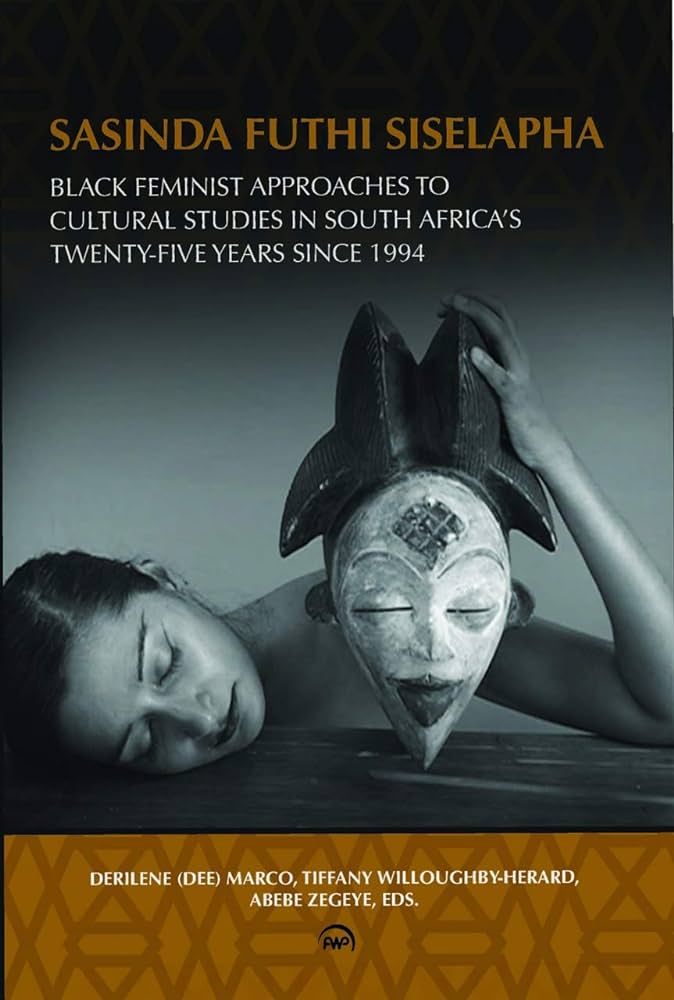
Review by Jenilene Francisco, University of California, Irvine
Publisher: Africa World Press, 2020
Length: 254 pages
Sasinda Futhi Siselapha (Still Here) is an edited volume of interdisciplinary scholars who work on ‘post-apartheid’ South Africa. The strength of the edited volume lies in the authors’ commitment to what feminist scholar Amina Mama calls the idea of activist scholarship[i]. While allowing for diversity in feminist methods and feminist tools, the idea of activist scholarship, according to Mama, offers a critical approach to scholarship that centers on a feminist ethic regarding the researcher’s social responsibility and constant examination of ethical tensions that may contradict feminist commitments.
One dilemma explored throughout the essays is the role of the diaspora. Zethu Cakata’s essay, South Africa belongs to all who speak colonial languages, argues that reclaiming indigenous languages is a powerful mode of decolonization. She refers to the parable Amandla Engwenya Asemanzini (the crocodile’s strength lies in the water) to remind African activists that a person is truly powerful in her own territory. Here, Cakata conceptualizes territory as one’s culture, being, and essence as opposed to a fixed territorial marker or nation-state. And according to Cakata, the deterioration of one’s essence begins with the loss of language. The African diaspora is not specifically mentioned in Cakata’s analysis. However, it can be inferred that the parable accounts for the diaspora’s role as they are also subject to the loss of their culture, being, and essence through assimilation.
The possibility of losing one’s essence raises the following questions: What role do feminists in the diaspora have in Africa’s knowledge production and liberation? Specifically, in the context of ‘post-apartheid’ South Africa, how can those in the diaspora continue the calls for decolonization that were central to the 2015 student movements #rhodesmustfall and #feesmustfall?
What started as a call to remove the statue of Cecil Rhodes at the University of Cape town turned into a national movement to decolonize education. The movement called attention to the violent legacies of apartheid that continues to be inscribed in the daily spaces of the university and curriculum. A participant of the UTC protest and feminist activist Kealeboga Ramaru describes the systematic exclusion against Black students in South Africa’s universities “that manifested itself through a Eurocentric curriculum, minimal staff transformation — where the majority of academics in senior positions and management were white — and, more shocking, that the University of Cape Town did not have a Black womxn professor in 2015” (90)[ii].
This year marks the eighth anniversary of the movement’s inception and removal of the statue. Yet the calls to decolonize violent spaces and overturn the social and economic exclusions in the ‘post-apartheid’ era remain pertinent to those in South Africa and those in the diaspora.
Throughout the edited volume, the authors carefully describe activists’ continuous labor and care since the end of apartheid. However, I will focus on three of the essays in sections three and four, aptly titled, Unsettling Laughter and The White Writing Offensive, respectively, as the authors detail the ‘post-apartheid’ realities that sparked #rhodesmustfall and #feesmustfall. Further, the authors theorize and make sense of the contentious, yet creative spaces activists and diasporic communities inhabit.
Abebe Zegeye’s essay, Entanglements: Post Apartheid South Africa, proposes a process of entanglement that he argues is a socio-political relationship in which white and black South Africans find themselves in after apartheid. Much like Cakata’s analysis of the intentional violence of colonialism and apartheid, Zegeye details the process of entanglement as a strategic project that was carefully choreographed to portray a unified rainbow nation at the cost of displacing the role of black South Africans who fought against apartheid’s anti-blackness. Zegeye mentions, for instance, the 1995 Truth and Reconciliation Commission. Despite being a momentous historical event, Zegeye refers to the commission as a “spectacle of excessive forgiveness” in which “the TRC encouraged a pernicious discourse in which the perpetrators and agents of apartheid – largely white and some blacks could now claim an equal share to blame” (138). An intentionally violent process, entanglement produces knowledge that has massive implications for future generations, robbing them of what Zegeye refers to as “the inheritance of a powerful struggle against ant-blackness” (140). The stakes of survival are clear in Zendeye’s analysis as the author reminds the reader — in South Africa and the diaspora — of her responsibility. It is one thing to theorize the process of entanglement to make sense of South Africa’s post-1994 environment. Yet it is another task to undo the process of entanglement, as even theorizing entanglement entails a political position that is far from neutral.
Robert Muponde’s essay, Going Native or Double Dipping: White Writing in Postcolonial Zimambwe and Post-Apartheid South Africa, draws attention to contemporary academics and how they unintentionally perpetuate what Zegeye refers to as the process of entanglement. White South African writers, especially during the 1990s, according to Muponde, underwent a cultural identity crisis with the loss of influence and mastery over South Africa’s identity. Good intentions aside, white South Africans began to essentialize black experiences in their search for redemption. Muponde cites the work of Antjie Krog as “a quagmire of postcolonial whiteness” (175). In Krog’s search for redemption in Berlin, Muponde details Krog as begging to be a black South African, but to the likes of what Muponde calls “the regal [black] fashion of Moshoeshoe and Mandela, but certainly not the underclass associated with township ‘necklace murders’ and violent service delivery protests which cause her moral quandaries in her narrative” (177). The privilege of pondering and the privilege of nostalgia Muponde attributes to Krog and contemporary white South African writers is a cautious note for researchers in the diaspora. The ability of Krog and academics in the diaspora to double-dip and claim to go native are ethical dilemmas that feminist social scientists across disciplinary fields have raised[iii]. And yet, it continues to happen even among well-intentioned social scientists and humanities scholars. It is worth quoting Muponde in full when the author states that “Double-dipping as a potential social prophylactic in the moments of crisis, is seen in the ways Krog stands to benefit in the moment of her praise, as an authority on post-apartheid whiteness and black-becoming” (183).
Lastly, Ashraf Jamal’s essay, Gradations in a blur: Some thoughts on what it means to be contemporary in South Africa, describes how African artists grapple with the growing ethos of western-centric modernism that is often tied to consumerist gallery spaces. Yet within those spaces, Jamal finds beauty and creativity in what he refers to as “blindsight.” The “blindsight” may take on artistic forms as Jamal cites South African artist Willem Boshoff’s Blind Alphabet, which relies on touch and, in doing so, spurred new forms of creation and perception in gallery spaces that have repeatedly prioritized the use of sight. In addition, Jamal argues that “blindsight” can be a way to “decolonize the imagination” and reject enforced binaries of what is local and international art. “Once again it is networking, flexibility, open source, and flow which prove the determining factors in changing the fate of Africa – that along with its vast captive youthful population,” according to Jamal (115). Similar to Jamal’s description of contemporary artists, those in the diaspora grapple with issues of agency and positionality – she does not know how to authorize herself and occupies an in-between space of not being “local” but subject to Eurocentric and western social and cultural exclusion. Much like Jamal’s take on contemporary artists, “absent of [her] own authority, art must look elsewhere to be taken seriously, and increasingly it appears it wants to be nothing more than familiar” (57). Yet Jamal cautions that familiarity is one step to reclaiming oneself and one’s authority. “Familiarity is not intimacy – it operates by proxy; vicariously through trickery or a sleight of hand,” cautions Jamal (116).
In summary, Sasinda Futhi Siselapha (Still Here) is a wonderful text to incorporate into graduate seminars for those who teach about the legacies of apartheid in South Africa. Although it would be helpful if students were familiar with apartheid and contemporary South African politics, unfamiliarity would not deter the reader from grasping the themes of structural anti-blackness, feminist ethics, and practices of scholar-activist care. Further, Sasinda Futhi Siselapha (Still Here) is a beautiful interdisciplinary text that can be used in graduate seminars focusing on writing and practicing feminist theory. As a Filipinx Ph.D. student, I struggle to find my role as a scholar who pays attention to empire at large and its impact on militarized gendered violence in the Philippines, all while paying careful attention to my positionality in the diaspora. Although the book centers on South Africa, the chapters offer theoretical contributions to making sense of the messy entanglement and responsibility to reclaim one’s essence for the sake of the community that goes beyond mere familiarity.
[i] Mama, Amina. “What Does It Mean to Do Feminist Research in African Contexts?” Feminist Review 98, no. 1_suppl (2011). https://doi.org/10.1057/fr.2011.22.
[ii] Ramaru, Kealeboga. “15. Black Feminist Reflections on the Rhodes Must Fall Movement at UCT.” Essay. In Rhodes Must Fall: The Struggle to Decolonise the Racist Heart of Empire, 89–96. Zed Books Ltd, 2018.
[iii] Ackerly, Brooke, and Jacqui True. “Reflexivity in Practice: Power and Ethics in Feminist Research on International Relations.” International Studies Review 10, no. 4 (2008): 693–707. https://doi.org/10.1111/j.1468-2486.2008.00826.x.
Kamala Visweswaran. “Betrayal: An Analysis in Three Acts.” In Fictions of Feminist Ethnography, 40–. NED – Newedition. University of Minnesota Press, 1994.
Narayan, Kirin. “How Native Is a ‘Native’ Anthropologist?” American anthropologist 95, no. 3 (1993): 671–686.
Schwartz-Shea, Peregrine, and Dvora Yanow. Interpretive Research Design: Concepts and Processes. Interpretive Research Design: Concepts and Processes. London: Routledge, 2012.
Timothy Pachirat. Among Wolves: Ethnography and the Immersive Study of Power. Taylor and Francis, 2017.
Jenilene Francisco (she/her/hers) is a Ph.D. candidate in the Political Science department at the University of California, Irvine. Her research interests focus on feminist ethnography and interpretive methods. Her dissertation projects look at women activists and organizations in the Philippines working to reclaim the silenced narrative of WWII's sexual violence.
